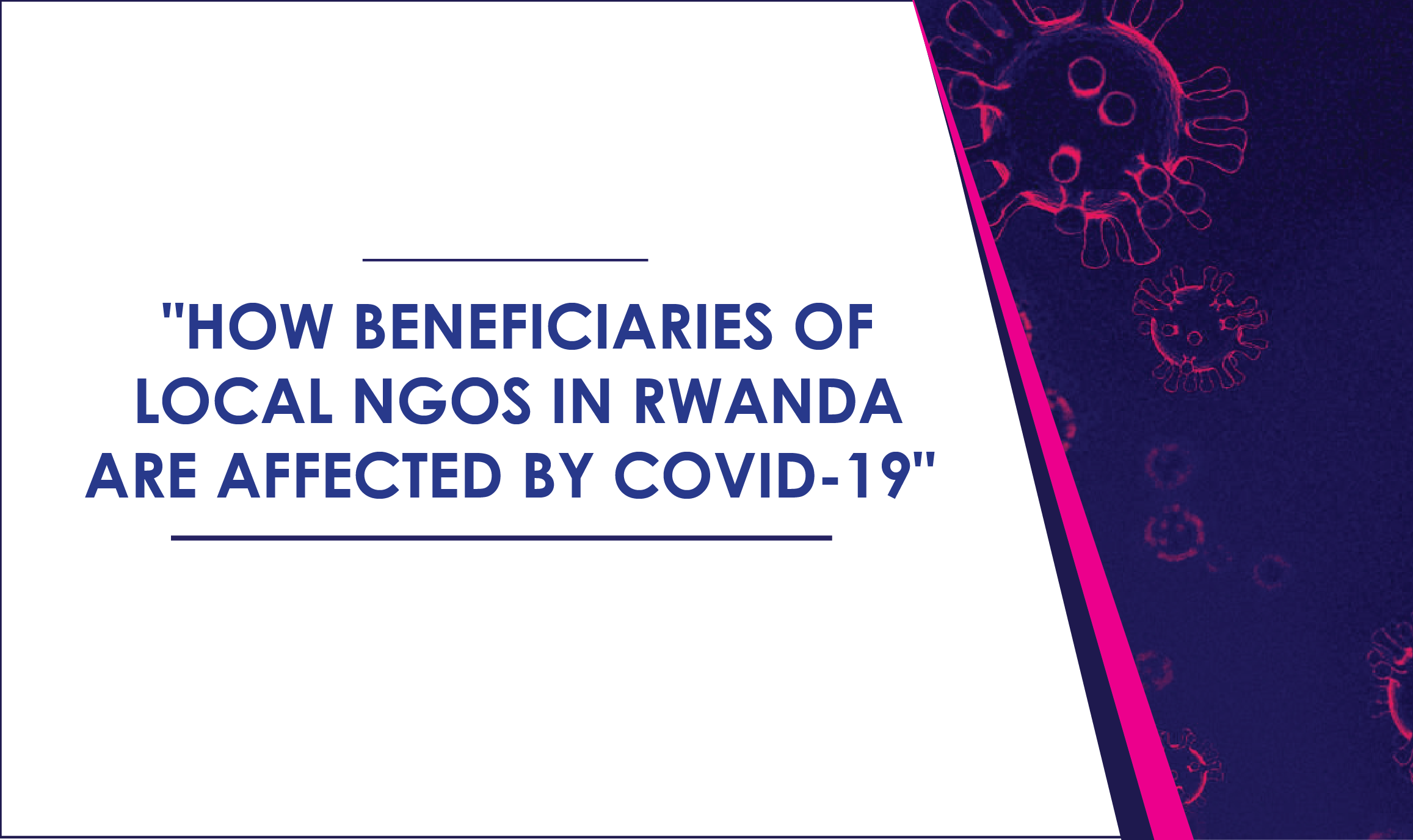According to the Rwanda Governance Board (RGB), the civil society remains a strategic partner for the Government of Rwanda to achieve its development goals through interventions carried out by a multi-diversity of both national and international organizations in order to support the citizens’ socioeconomic advancement.
As of December 2018, RGB counted 1,335 national NGOs and 173 International NGOs[1]. Due to the COVID-19 pandemic, NGOs’ operations have been affected both at the national and community level. While the current pandemic affected the local NGOs funding and human capital, it has equally affected the lives of the local NGOs’ beneficiaries. The unprepared disrupt of field activities, has significantly affected the beneficiaries who were not prepared for the possible suspension of programmes activities. Although some NGOs’ staff continued to engage the beneficiaries through phone, TV, radio and social media, the physical interaction is of high advantage when serving the vulnerable rural communities who do not necessarily have IT tools.
In this period, local NGOs are facing diverse challenges and one of these is compromising the already achieved progress in terms behavioural change. The focus of beneficiaries has shifted to the respect of measures to prevent COVID-19, with little or no priority to the behaviour change they have been taught by local NGOs such as dealing with malnutrition among children, literacy skills among adults, savings, etc. One example is that of community members under healing programmes who have already achieved a certain level of healing and resilience, may be affected by this period due to lack of psychological support. These beneficiaries are struggling with; unhealed trauma, poverty chocks and other challenges related to lockdown. It is evident that the lockdown and fear from COVID-19 could have revived some wounds among some beneficiaries with very fragile emotion.
For example in Huye District, Rusatira sector, when two genocide survivors (members of NAR’s Spaces for peace) heard that the country will be on lockdown they begun having flash backs that they were reliving the 1994 Genocide against the Tutsis because all citizens were told to ‘stay at home’. A similar case was documented in Gasabo District, Rutunga sector, where a female member of NAR’s Space for peace locked herself in her house in fear that the genocide was reoccurring. This shows that the self-isolation or social lockdown could aggravate the traumatic stress, confusion and anger, all of which are exacerbated by the fear of infection, having limited access to supplies of necessities, inadequate information or the experience of economic loss or stigma. This stress and anxiety could lead to an increase in domestic and family violence[2].
In addition, the lockdown could worsen the achieved efforts in conflict resolution process among families living in conflicts as well as increase the gender based violence. According to World Health Organizations, the disruption of social and protective networks, and decreased access to services can exacerbate the risk of violence for women[3]. During this COVID-19 pandemic, where movement is restricted, people are confined, and protection systems are weakened, women and girls are at greater risk of experiencing gender-based violence, and the threat of harmful practices including female genital mutilation and child, early, and forced marriages, especially for girls in disadvantaged and hard-to-reach areas[4].
Since the achieved momentum was not necessarily kept by beneficiaries, this will require local NGOs extra efforts and resources to normalize the situation after COVID-19, before embarking on implementation of new activities, something that could cause delay to meet the targeted milestones. Secondly, some NGOs will be viewed as irrelevant in this period. Majority of beneficiaries are expecting more physical and economic support than moral and psychological support from their local NGOs, however, few local NGOs, especially faith based organizations and local NGOs that work in humanitarian sector, have been able to provide beneficiaries with tangible support such as food stuff, materials, money, etc.
Other NGOs working in other sectors and whose budgets are not flexible to meet unexpected needs, have been only involved in sensitization of their beneficiaries to cope with preventive measures adopted by the government of Rwanda. In such cases, if the expectations of beneficiaries are not met, they could consider these NGOs as irrelevant even if they have viewed them as important before the pandemic. This will affect the relationship between local NGOs and beneficiaries and this may deteriorate local NGOs’ reputation and visibility in communities.
Since it is quite difficult to physically meet with their boundary partners, local NGOs are urged to find out alternatives avenues to keep connections with their beneficiaries. For example using the locally present staff, Facebook pages, YouTube, phone calls, emails, radio and TV shows, among other possible platforms would be efficient. This will help local NGOs to keep ties with beneficiaries and will help to save NGOs’ image and visibility. For example District level psychotherapists at Never Again Rwanda have been in collaboration with Peace Agents, who are based in communities, and jointly through phone calls and Whatsapp messages, provided support to some of the beneficiaries of the healing programme, who have been traumatized during the lockdown period.
Its vital for local NGOs that are not involved in emergency and humanitarian programs to make clear their mandate and mission to their constituencies to avoid expectations about material and financial support.
By Celestin Nsengiyumva
Expert in M&E and project management
[1] http://rgb.rw/non-governmental-and-faith-based-organisations/non-goverment-organisations/
[2] https://www.weforum.org/agenda/2020/03/this-is-the-human-impact-of-covid-19-and-how-business-can-help/
[3] https://www.who.int/reproductivehealth/publications/emergencies/COVID-19-VAW-full-text.pdf
[4] Coronavirus Disease (COVID-19) Preparedness and Response UNFPA Interim Technical Brief https://www.unfpa.org/sites/default/files/resource-pdf/COVID-19_Preparedness_and_Response_-_UNFPA_Interim_Technical_Briefs_Gender_Equality_and_GBV_23_March_2020_.pdf


